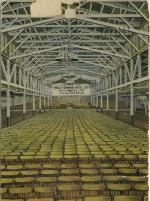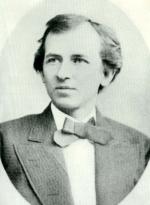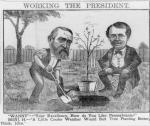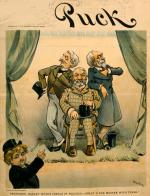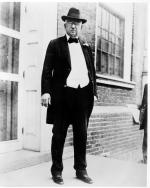![header=[Marker Text] body=[Philadelphia merchant, famed for the department stores bearing his name. In 1861 he opened his first store. He built his "new kind of store" here in 1876 and implemented new concepts including the one-price system and money-back guarantee. Active in public life, he built schools, churches, and missions in this and other nations. As U.S. Postmaster General, 1889-93, he fostered rural free delivery and introduced the commemorative stamp. ] sign](http://explorepahistory.com/kora/files/1/10/1-A-3BF-139-ExplorePAHistory-a0m8d3-a_450.jpg)
Mouse over for marker text
Name:
John Wanamaker [Politics]
Region:
Philadelphia and its Countryside/Lehigh Valley
County:
Philadelphia
Marker Location:
Juniper and S. Penn St., Philadelphia
Dedication Date:
July 11, 1998
Behind the Marker
During the winter of 1875-76, evangelist Dwight Moody, fresh from his triumphant two-year tour of England, came to Philadelphia. With him was Pennsylvania's own gospel songwriter, Ira Sankey, who led in song the huge crowds that came to hear the inspiring speaker. Sponsoring the tour, one of the largest and most highly publicized religious gatherings in the history of the city, was John Wanamaker (1838-1922), owner of what would become the world's largest retail clothing store.
The son of a Philadelphia brickmaker, Wanamaker between 1858 and 1861 had served as the first national secretary of the Young Men's Christian Association (YMCA). Under his guidance the YMCA became a nationwide force for religious revival and temperance, as thousands of Union soldiers in the Civil War joined up. Wanamaker quit the YMCA in 1861 to open his first clothing store, and in 1868 started the first "John Wanamaker and Co." at 818 Chestnut Street. In the decades that followed, he helped develop the American department store. He was the first to offer customers a single price to eliminate haggling and a money-back guarantee on all items, and introduced a succession of innovations in mass marketing.
Less than a year after Moody's tour, the Great Centennial Exhibition brought hundreds of thousands to Philadelphia. Wanamaker built a huge emporium on the site of the old Pennsylvania Railroad station at Thirteenth and Market streets, took out full-page newspaper advertisements, and sent both people and carts around the city with signs to hawk his wares. Wanamaker opened the nation's first restaurant in a department store, sent his buyers to Europe, and made his the first store in the nation to use electricity.
Wanamaker also became Philadelphia's leading lay evangelist, hosting and speaking at numerous religious meetings. Under his direction, the Bethany Sunday School on South Street in Philadelphia became the largest Sunday school in the country. He also practiced and preached the "Social Gospel," a brand of Christian activism that flourished in late-nineteenth century America. Like George Westinghouse - and unlike corporate leaders
George Westinghouse - and unlike corporate leaders Frank Gowen and
Frank Gowen and Jay Gould, Wanamaker believed that a Christian businessman had a moral responsibility for the welfare of his employees. He opened an insurance company, women's hotel, library, and business school for his workers, and a summer camp for their children and for the children of the city's poor.
Jay Gould, Wanamaker believed that a Christian businessman had a moral responsibility for the welfare of his employees. He opened an insurance company, women's hotel, library, and business school for his workers, and a summer camp for their children and for the children of the city's poor.
Wanamaker also helped make Mother's Day a national holiday when he staged the nation's first Mother's Day on the plaza between Wanamaker's store and Philadelphia City Hall in 1908.
Mother's Day a national holiday when he staged the nation's first Mother's Day on the plaza between Wanamaker's store and Philadelphia City Hall in 1908.
In 1911, Wanamaker opened a massive new store opposite Philadelphia's City Hall, which contained a concert hall, elegant restaurant, works of art, and an expansive array of goods and services to draw customers for shopping and leisure. For the generations who agreed to meet under the great bronze eagle on the main floor, it served as a symbol of the compatibility of capitalist consumption and cultural refinement.
Wanamaker was more than the greatest department-store magnate of Gilded Age America. He also threw himself into politics and reform causes with the same gusto and intelligence that marked his career as a businessman. As his business prospered, Wanamaker continued his religious activities, but reform politics became the focus of his later years.
In 1889 President Benjamin Harrison appointed Wanamaker the nation's postmaster general as a reward for his support during the 1888 presidential election. Wanamaker then applied his organizational genius to the United States mail. He instituted direct delivery of mail to the nation's rural areas - thereby opening over 5,000 new mail routes - and sought, unsuccessfully, to have the mail deliver parcel post packages. (He was awarded the honor of mailing the first such package in 1913 when the service was finally implemented.)
rural areas - thereby opening over 5,000 new mail routes - and sought, unsuccessfully, to have the mail deliver parcel post packages. (He was awarded the honor of mailing the first such package in 1913 when the service was finally implemented.)
The postal savings system he started, which survived until 1963, also enabled people in remote areas with small amounts of money to use their local post office as a bank. The nation's first commemorative stamps were issued under his administration to commemorate the four-hundredth anniversary of Columbus' "discovery of America."
In 1896 Wanamaker placed his name in the running for the United States Senate. Despite his business, religious, and national achievements, Wanamaker was no match for the Pennsylvania Republican machine dominated by Matthew Quay. After Wanamaker's campaign manager was falsely accused of vote-buying, the state legislature instead nominated state senator Boies Penrose from Philadelphia, one of Quay's powerful lieutenants. Wanamaker was outraged, and in 1897 helped organize the opposition to what he called "Quayism."
Matthew Quay. After Wanamaker's campaign manager was falsely accused of vote-buying, the state legislature instead nominated state senator Boies Penrose from Philadelphia, one of Quay's powerful lieutenants. Wanamaker was outraged, and in 1897 helped organize the opposition to what he called "Quayism."
In 1898, Wanamaker ran for governor and traveled the state delivering speeches against the "corrupt and costly government of Pennsylvania" run by the "Quay machine," which he published under the title, The Speeches of Hon. John Wanamaker on Quayism and Boss Domination in Pennsylvania Politics. Wanamaker's race ended when Quay's selection,
"corrupt and costly government of Pennsylvania" run by the "Quay machine," which he published under the title, The Speeches of Hon. John Wanamaker on Quayism and Boss Domination in Pennsylvania Politics. Wanamaker's race ended when Quay's selection, William Stone, defeated him in the Republican primary. Wanamaker did, however, have the satisfaction of watching Quay spend three years trying to secure his own contested Senate seat, after Quay was indicted for the misappropriation of state funds. Wanamaker then retired from politics, concentrating his remaining years on business and religious activities, including lay preaching, until his death in 1922.
William Stone, defeated him in the Republican primary. Wanamaker did, however, have the satisfaction of watching Quay spend three years trying to secure his own contested Senate seat, after Quay was indicted for the misappropriation of state funds. Wanamaker then retired from politics, concentrating his remaining years on business and religious activities, including lay preaching, until his death in 1922.
Today, sales methods developed by Wanamaker are taken for granted throughout the world, as are the improvements to the postal service he instituted. His religious work bore fruit in thousands of conversions. Yet despite his powerful advocacy of honest government, his fame as one of the nation's leading entrepreneurs, and his reputation as a religious reformer who brought morality to both the workplace and politics, he could not win elective public office. His failure to do so speaks volumes about the power of Pennsylvania's Gilded Age Republican machine.
The son of a Philadelphia brickmaker, Wanamaker between 1858 and 1861 had served as the first national secretary of the Young Men's Christian Association (YMCA). Under his guidance the YMCA became a nationwide force for religious revival and temperance, as thousands of Union soldiers in the Civil War joined up. Wanamaker quit the YMCA in 1861 to open his first clothing store, and in 1868 started the first "John Wanamaker and Co." at 818 Chestnut Street. In the decades that followed, he helped develop the American department store. He was the first to offer customers a single price to eliminate haggling and a money-back guarantee on all items, and introduced a succession of innovations in mass marketing.
Less than a year after Moody's tour, the Great Centennial Exhibition brought hundreds of thousands to Philadelphia. Wanamaker built a huge emporium on the site of the old Pennsylvania Railroad station at Thirteenth and Market streets, took out full-page newspaper advertisements, and sent both people and carts around the city with signs to hawk his wares. Wanamaker opened the nation's first restaurant in a department store, sent his buyers to Europe, and made his the first store in the nation to use electricity.
Wanamaker also became Philadelphia's leading lay evangelist, hosting and speaking at numerous religious meetings. Under his direction, the Bethany Sunday School on South Street in Philadelphia became the largest Sunday school in the country. He also practiced and preached the "Social Gospel," a brand of Christian activism that flourished in late-nineteenth century America. Like
Wanamaker also helped make
In 1911, Wanamaker opened a massive new store opposite Philadelphia's City Hall, which contained a concert hall, elegant restaurant, works of art, and an expansive array of goods and services to draw customers for shopping and leisure. For the generations who agreed to meet under the great bronze eagle on the main floor, it served as a symbol of the compatibility of capitalist consumption and cultural refinement.
Wanamaker was more than the greatest department-store magnate of Gilded Age America. He also threw himself into politics and reform causes with the same gusto and intelligence that marked his career as a businessman. As his business prospered, Wanamaker continued his religious activities, but reform politics became the focus of his later years.
In 1889 President Benjamin Harrison appointed Wanamaker the nation's postmaster general as a reward for his support during the 1888 presidential election. Wanamaker then applied his organizational genius to the United States mail. He instituted direct delivery of mail to the nation's
The postal savings system he started, which survived until 1963, also enabled people in remote areas with small amounts of money to use their local post office as a bank. The nation's first commemorative stamps were issued under his administration to commemorate the four-hundredth anniversary of Columbus' "discovery of America."
In 1896 Wanamaker placed his name in the running for the United States Senate. Despite his business, religious, and national achievements, Wanamaker was no match for the Pennsylvania Republican machine dominated by
In 1898, Wanamaker ran for governor and traveled the state delivering speeches against the
Today, sales methods developed by Wanamaker are taken for granted throughout the world, as are the improvements to the postal service he instituted. His religious work bore fruit in thousands of conversions. Yet despite his powerful advocacy of honest government, his fame as one of the nation's leading entrepreneurs, and his reputation as a religious reformer who brought morality to both the workplace and politics, he could not win elective public office. His failure to do so speaks volumes about the power of Pennsylvania's Gilded Age Republican machine.
Beyond the Marker




